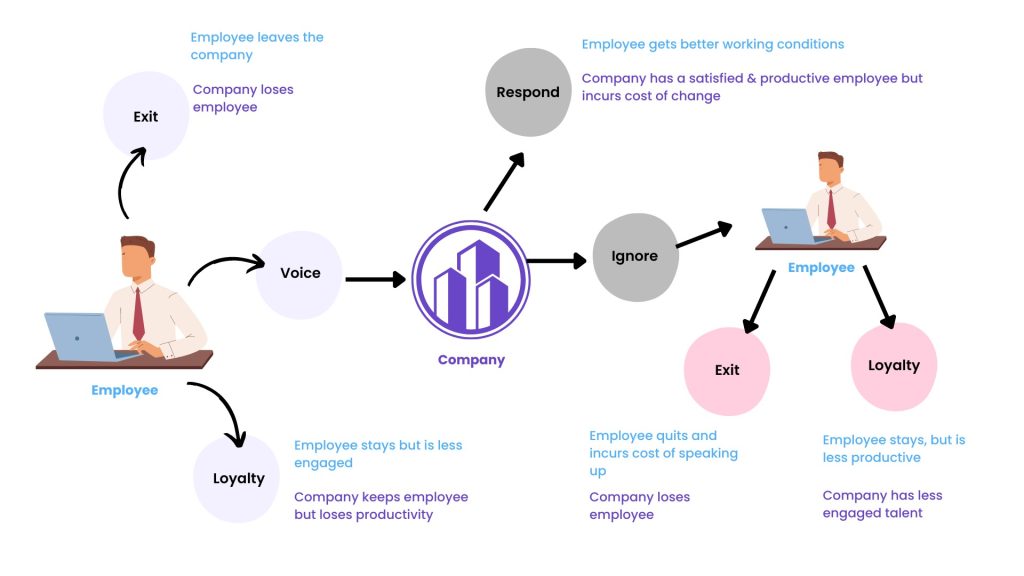Have you ever thought of your workplace as a game of organizational dynamics?
Picture yourself in the middle of an important team project, where each decision holds significant weight. Now, imagine you propose an idea that has the potential to revolutionize the project. Instead of being met with enthusiasm, your colleagues laugh off your suggestion and promptly brush it aside.
Suddenly you find yourself in a workplace environment where psychological safety is low. Psychological safety is a much talked about subject currently. Studies have shown that when there is a deficiency in psychological safety, it can result in reduced trust and cooperation, increased stress and exhaustion, decreased efficiency and originality, and higher rates of employee turnover. In this article though I will take a science driven light hearted approach and explain it to you through economic theory.
It’s like a multi-choice quest, and you have to choose between leaving the team, voicing your concern, or staying silent. Which one would you choose?
Just like in any game, employees and managers have to make critical decisions that can affect their careers and the success of their teams. But there’s a central theme that can make or break the game: psychological safety.
Understanding the exit-voice-loyalty theory
In this critical scenario, you must understand the exit-voice-loyalty theory. Some of you economic theory or Adam Smith enthusiasts may have heard of it.
Drawing from economic theory, the exit-voice-loyalty framework provides valuable insights when it comes to addressing psychological safety in the workplace.
The exit-voice-loyalty theory suggests that when individuals encounter dissatisfaction within an organization, they have three options: leave the organisation (exit), speak up about their concerns or provide suggestions for change (voice), or stay despite the dissatisfaction (loyalty).
Psychological safety exists when team members feel safe to take interpersonal risks, such as speaking up with ideas, questions, concerns, or even mistakes, without fear of retribution or embarrassment. In such an environment, employees feel valued, respected, and confident that their contributions will be heard and respected.

Applying the theory to workplace scenarios
In this game, exit seems like the easiest choice. Employees can simply leave the organisation altogether and the management can forget about all the issues. But beware, losing valuable talent can be a blow to productivity and hurt the organisation’s performance.
Voice is the second option, and it means speaking up within the organisation to address issues and initiate change. But without the safety net of psychological safety, employees may hesitate to voice their concerns, stifling innovation and allowing systemic problems to persist.
Loyalty, on the other hand, encourages employees to remain with the organisation despite their dissatisfaction. But if individuals feel unable to express their concerns freely, their loyalty can contribute to a culture of silence and stagnation.
Now what did we learn from this?
Building psychological safety: The winning move
Ultimately you would like to enable employees to choose the voice of path which in turn will lead to prevalence of psychological safety in the organisation. By creating an environment where employees feel safe to voice their opinions, organisations empower individuals to choose the path of voice, mitigating the risk of talent loss, and fostering a culture of openness, trust, and collaboration.
In this game of organisational dynamics, psychological safety serves as the guiding principle, influencing the choices individuals make—whether to exit, voice, or remain loyal. By investing in psychological safety, organisations not only retain their top players but also unlock the full potential of their teams, driving innovation, productivity, and long-term success. Sounds like a game worth playing, right?
At Serein, we understand the importance of psychological safety in driving organisational success. Our assessments help organisations evaluate their current level of psychological safety, identify areas for improvement, and implement tailored solutions to foster a culture of openness, trust, and collaboration.
Contact us at hello@serein.in and let’s win the game together!


